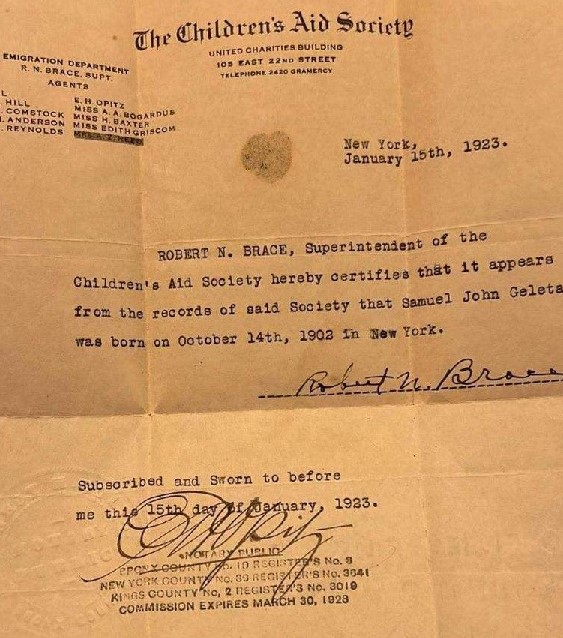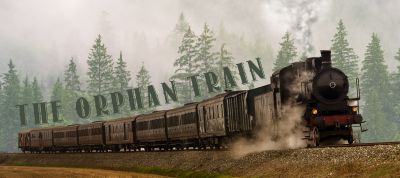A deep dive into a little known chapter in US History, with local connections
By: Johanna Elattar, image provided
In the intricate tapestry of American history, a chapter often overshadowed yet profoundly influential emerges—the Orphan Train Movement. This captivating initiative, situated between the pages of the 19th and early 20th centuries, unfolds as a narrative of compassion and societal evolution, offering abandoned children a transformative ticket to a brighter future.
Conceived by the visionary Charles Loring Brace, a social reformer and founder of the Children’s Aid Society, the Orphan Train responded to the surging number of orphaned children in East Coast urban centers. Faced with overcrowded orphanages and the daunting challenge of finding adoptive homes, Brace envisioned a groundbreaking solution: transport these children to the rural Midwest, where families were abundant, but children were scarce.
Initiated in 1854, the Orphan Train embarked on a mission to match homeless children with families yearning for both labor and companionship. Laden with hope and dreams, trains departed from bustling cities like New York, bound for the expansive landscapes of the Midwest, marking the inception of a controversial but undeniably significant chapter in American history.

The debates surrounding the Orphan Train system mirrored the passion of the journeys themselves. Critics decried it as a form of child trafficking, while advocates saw it as an opportunity for destitute children to seize a better life. Yet, despite the controversies, the trains persisted, carrying the aspirations and futures of thousands of children.
For those on board, the journey became both a physical and emotional odyssey. Separated from familiar surroundings, these children clung to the hope of finding families that could offer them love and stability. Upon arrival in small towns and farming communities, the children underwent inspection, often chosen based on perceived usefulness for farm work or domestic chores.
The triumphs and trials of the Orphan Train Movement are as diverse as the children who participated. Many found loving families, received an education, and went on to lead successful lives. However, some faced challenges and hardships, struggling to adapt to their new environments.
Today, descendants of Orphan Train riders still gather to share stories, weaving a tapestry of resilience and fortitude. One such compelling tale comes from Mrs. Ruth Testani and her daughter, Roseanne Testani Wall, of Hornell. I had the privilege of speaking with them, and whose family’s connection to the Orphan Train is a testament to the enduring legacy of this historic movement.
Ruth Testani’s father, Sam Geleta, was one of the children on the Orphan Train. Abandoned at 18 months old on the doorstep of an asylum for pregnant and unmarried women, Sam, along with children of all ages, boarded the train bound for an uncertain destiny.

Sam’s journey on the train was marked by incessant crying, a desperate plea for a family. Miraculously, in Manilla, Iowa, Sam found a new home with Ms. Ella Hoes, a woman of German descent. Though Ms. Hoes passed away a few years later, Sam’s daughter, Ruth, attests to the enduring kindness Ms. Hoes showed him.
Sam faced adversity on his journey, surviving a life-threatening accident on the farm that nearly cost him his leg. Yet, his resilience prevailed, and he found purpose and passion, working for the railroad for many years. Sam’s true love, however, was his family, a sentiment echoed by his daughter, Ruth.
Ruth, a mother of ten children, married for 63 years before her husband’s passing, shares a connection to adoption, with her first two children, Jovena and Tom, being adopted, while the remaining eight are her biological children. Sam Geleta’s journey, from the Orphan Train to a life dedicated to family and hard work, epitomizes the resilience and adaptability that defined many survivors of this historic movement.
Though the Orphan Train completed its operations in the early 20th century, its impact reverberates in the hearts and histories of countless families across the nation. The Geleta and Testani families stand as living testaments to the enduring legacy of the Orphan Train Movement, their stories intricately woven into the rich fabric of American history, revealing the destined tracks that shaped their remarkable journeys.

Johanna Elattar is a Hornell NY based writer who can write about community stories with larger connections or big stories with local connections. You can reach her anytime, hauntedhill@yandex.com






